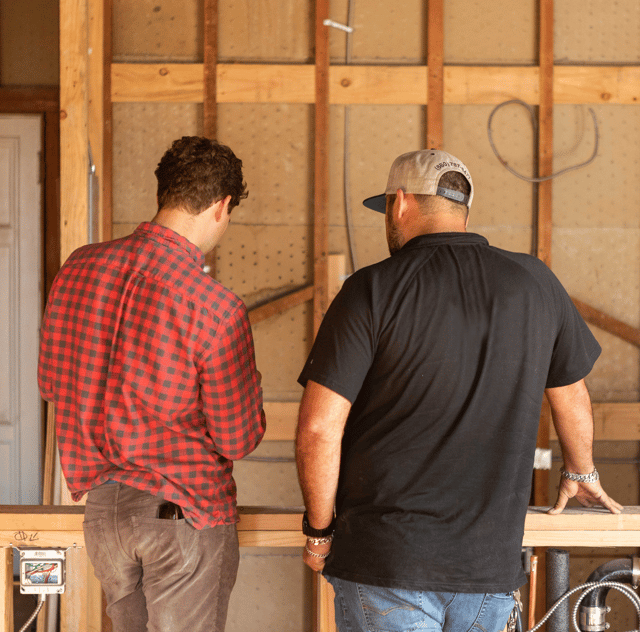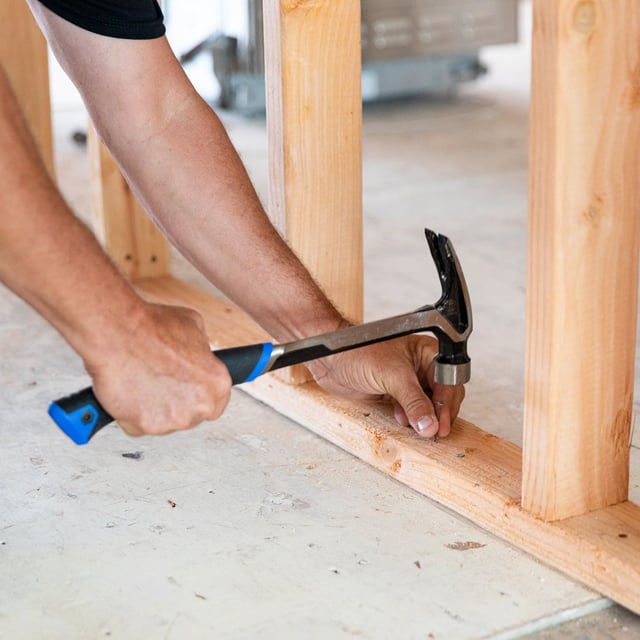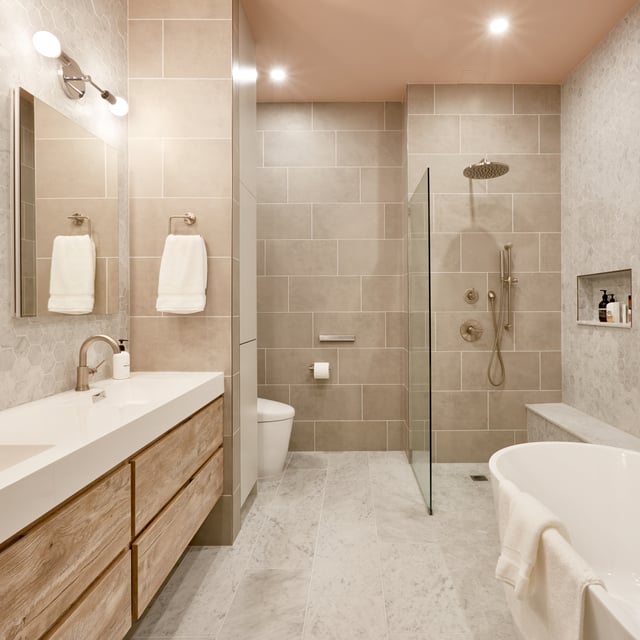
Working with Contractors
The Block Way of Renovating: A Complete Homeowner’s Guide
11.24.2025
Our New Year savings event is here: Get up to $6,500 off your project today (terms apply).


In This Article
We all know the thrill of a home renovation—the promise of Pinterest-worthy transformations, the allure of finally banishing that questionable wallpaper from the '70s. But before you start imagining your grand reveal moment (complete with dramatic before-and-after photos), let's talk reality. Without a solid budget, your dream project can spiral into a full-blown financial horror story faster than you can say, "unexpected plumbing issue."
Here's the deal: a renovation budget isn't just some annoying spreadsheet—it's your renovation's best friend. It keeps overspending at bay, prevents unexpected delays from turning your timeline into a joke, and ensures you don't end up Googling, "Is it okay to live without a kitchen for six months?" Whether you're tackling a bathroom refresh or a whole-home overhaul, having a structured plan for your money means fewer surprises and more celebrations.
This guide will cover the essentials of creating a renovation budget that works for you. You'll learn how to estimate costs like a pro (spoiler: those TikTok hacks don't always account for labor), allocate your funds wisely (no, you can't spend it all on fancy tile), and prepare for contingencies (because life happens, even to your dream project). With these tools, you'll feel more in control and less like you're starring in a renovation reality show where things always go wrong. Ready? Let's make those #renovationgoals a reality—without blowing up your bank account.
So, you've decided to renovate. Congrats! Whether you're ripping out shag carpet or finally upgrading your avocado-green bathroom, the first step is figuring out what you're doing—and why. A little self-reflection here will save you from becoming the person who spends a small fortune on gold faucets but forgets about, you know, plumbing.
Before you start dreaming of open-concept kitchens or spa-like bathrooms, ask yourself: what are you renovating, and why? Is it your dated kitchen where the drawers barely open, or the basement that smells like...basement? Be honest about what needs the most attention.
Next, divide your wish list into two categories: must-haves and nice-to-haves. The must-haves are the non-negotiables that make your home livable or improve safety, like replacing that sketchy electrical panel. The nice-to-haves? That's the stuff you'd love if the budget allows, like heated floors or a wine fridge. This is your time to dream big but also keep it real. If your budget is tight, the custom marble countertop might have to wait.
Now that you've sorted your priorities, let's talk goals. Are you renovating to make your home more functional? Maybe you're tired of the one bathroom becoming a battleground every morning. Or is this about boosting your home's resale value? A fresh coat of paint and modern fixtures can go a long way when wooing future buyers.
Of course, there's also the aesthetic angle—because who doesn't want a home that feels like it belongs in a magazine? Just remember: your goals should guide every decision. Want more functionality? Don't spend the entire budget on trendy lighting. Increasing resale value? Focus on updates with the highest return on investment, like kitchens and bathrooms.
When you define your objectives, you're less likely to get distracted by shiny things that don't actually serve your endgame. (Looking at you, decorative barn doors that lead to nowhere.) By staying focused on what really matters, you'll have a renovation that not only looks great but works for your lifestyle—and maybe even your wallet.
Now that you've assessed your goals, it's time to roll up your sleeves and start planning. Because while dreaming is fun, nailing down the details is where the magic (and savings) happen.
You've got your renovation goals nailed down, but now comes the not-so-glamorous part: figuring out how much this dream is going to cost. Spoiler alert: it's probably more than you think. But don't panic yet! With a little research, you'll get a clear picture of what you're in for—financially, at least. Emotionally, well, that's another story.
First things first: gather some inspo. This is the fun part! Spend an afternoon on Pinterest creating boards that scream, "This is my dream kitchen!" Flip through design magazines, or check out Block Renovation's project examples for a dose of reality-meets-inspiration. But remember: it's easy to get carried away. While you might fall in love with a $10,000 chandelier, it's probably best to price out the essentials before lighting up your life like that.
Once you have a general vibe in mind, start researching actual costs. Materials, labor, and fixtures all come with wildly different price tags depending on your choices. A quartz countertop will cost much more than laminate (but it also lasts longer). And let's not forget labor costs—because unless you're planning to DIY the entire thing (and are handy with power tools), you'll need to factor in what contractors charge.
This is where the pros come in. Before you commit to any grand plans, schedule consultations with contractors or renovation experts. They'll help you determine what's realistic for your budget and timeline. Plus, they can spot potential issues that would never cross your mind—like whether removing that wall will make the ceiling collapse. Fun stuff.
Contractor estimates are also essential because they include the nitty-gritty details: labor costs, material expenses, and those delightful contingencies for when something inevitably goes wrong (because it will). A pro can give you a clearer picture of what's achievable and what's just a Pinterest pipe dream.
Okay, let's break it down. A typical renovation budget can usually be divided into three main categories:
Knowing these percentages upfront can help you allocate your funds strategically. Now you're ready to move forward armed with knowledge—and maybe a slightly less intimidating budget.
Ah, budgeting—the part of a renovation that takes your dreamy Pinterest board and hits it with a dose of cold, hard reality. Setting a realistic budget is the key to keeping your project on track and ensuring you don't end up eating instant noodles in a half-finished kitchen for six months. Let's get into it.
First things first: how much can you actually afford to spend? Take a good, honest look at your finances. Are you pulling from savings, taking out a loan, or using financing options like a home equity line of credit? If you're planning to borrow, now's a good time to calculate those interest rates because the last thing you want is to pay for your new bathroom until 2050.
Pro tip: set a budget ceiling and mentally subtract 20% from it. That way, when surprises pop up—and trust us, they will—you'll still have a financial cushion. No one wants to hear "dry rot" and "additional costs" in the same sentence, but these things happen.
Once you've landed on your total budget, it's time to slice and dice it into categories. Think of it like divvying up a pie—except this pie includes labor, materials, permits, and design fees instead of cherry filling.
Labor is usually the biggest chunk, taking about 30-35% of your budget. Materials come next, claiming around 40%. Then there are permits and inspections—yes, you need them, and no, they're not free. Finally, don't forget about design fees if you're hiring an interior designer or architect. Skimping on this step can lead to costly mistakes later, like discovering your custom cabinets block the fridge door.
Breaking it down like this helps you see where your money is going and lets you adjust if needed. Can you swap that imported tile for something local? Maybe scale back on the custom built-ins? The more you know, the better decisions you can make.
Here's the golden rule of renovations: always expect the unexpected. That's why a contingency fund is non-negotiable. Set aside 10-20% of your total budget for those delightful surprises—like discovering your electrical system is older than you thought or that the foundation needs work.
Think of the contingency fund as your safety net. Without it, you're one unforeseen expense away from financial chaos. With it, you can handle hiccups like a pro and still have money left for the fun stuff, like that gorgeous backsplash you've been eyeing.
The key to a realistic budget is planning for everything—including what you can't plan for. With your total budget, expense breakdown, and contingency fund in place, you'll be ready to tackle your renovation with confidence (and hopefully a little cash left over for celebratory takeout).
You've got a budget—great start! But let's be honest, sticking to it might feel like trying to stay within the speed limit on an empty highway. Temptation lurks everywhere in the form of fancy light fixtures, luxe tiles, and things you didn't even know you needed. (A smart toilet? Really?) To avoid veering off track, you'll need to prioritize and make some strategic adjustments. Let's talk about how.
When it comes to renovations, not all dollars are created equal. The secret to a smart budget? Knowing where to splurge and where to save. Think of it like picking your battles: you're willing to go all out for durable materials and timeless designs, but maybe you're okay saving a few bucks on things that don't need to be top-of-the-line.
For example, go ahead and splurge on things like high-quality countertops and flooring—these take a beating and need to last. On the other hand, do you really need that $400 artisan towel hook? Probably not. And don't underestimate the power of DIY for small elements, like painting or assembling basic furniture. Sure, you might end up covered in paint and saying words your kids shouldn't hear, but it's worth it for the savings.
The key is balance. By making thoughtful trade-offs, you can focus your budget on the things that matter most and cut back on the things that don't.
If your renovation dreams are bigger than your budget, consider taking the phased approach. It's like eating a massive chocolate cake—sometimes tackling it one slice at a time is better. Breaking your project into manageable stages can help you spread out costs without sacrificing your vision.
For instance, if you're redoing your entire home, start with the spaces you use the most, like the kitchen or bathroom. Save the guest room and basement makeover for a future phase. Not only will this make the financial load lighter, but it'll also give you a chance to live with your choices and adjust as you go. Who knows? By the time you get to phase two, you might decide you don't need a built-in wine cellar after all.
Phased renovations also give you breathing room to recover financially (and emotionally) between stages. Plus, you'll avoid the chaos of living in a house that feels like a construction site from top to bottom. Just remember to plan the phases carefully—no one wants to find out halfway through that their kitchen update made the new living room layout impossible.
Prioritizing and adjusting your budget is all about staying flexible and focusing on the bigger picture. With a few smart trade-offs and a phased plan, you can get the home you want—without losing your mind (or your savings) in the process.
Congratulations! You've set your budget, prioritized your spending, and maybe even decided on your backsplash (go you!). But the real challenge? Sticking to that budget while the costs creep in like uninvited guests at a party. Managing your renovation costs is all about staying vigilant, negotiating like a pro, and sidestepping budget pitfalls that can turn your dream project into a nightmare.
First rule of managing costs: know where your money is going. Renovations have a sneaky way of nickel-and-diming you, so tracking every expense in real time is important. Use tools or apps like Mint, HomeZada, or even a good old-fashioned spreadsheet (if you're the DIY type). These tools help you see at a glance if you're staying on track—or if you've somehow spent half the budget on lighting fixtures alone.
Tracking your spending isn't just about numbers; it's about accountability. When you see that you're approaching the limit in one category, you can make adjustments before it's too late. Think of it as your renovation financial GPS: it keeps you from getting lost in the wild jungle of costs.
Here's the thing: almost everything in a renovation is negotiable. Contractors, suppliers, and even big-box stores often have wiggle room in their pricing—you just have to ask. Buying tiles in bulk? See if the vendor will cut you a deal. Sourcing materials? Ask about alternative options that might look just as good for less.
If negotiating isn't your strong suit, remember this: vendors want your business, and a polite but confident request for discounts or upgrades rarely hurts. Worst case, they say no. Best case, you save enough to splurge on that statement light fixture you've been eyeing.
And don't stop at materials—contractors are often willing to work with your budget too. If a full scope of work is outside your price range, ask about ways to cut costs, like doing some of the prep work yourself (hello, demolition day!) or sourcing your own materials.
Finally, let's talk about the landmines that can blow up your budget faster than you can say "change order." The biggies? Skipping permits, overlooking taxes, and underestimating labor costs. Sure, permits are a pain, but skipping them can lead to hefty fines and even costlier fixes later. Trust us—it's not worth the risk.
Then there are the sneaky costs, like sales tax and delivery fees, which can add up quickly if you're not careful. And let's not forget labor—always budget extra for the time it takes to deal with unexpected surprises, like discovering your walls are stuffed with 50-year-old newspaper instead of insulation.
Managing renovation costs takes effort, but you can keep your budget intact with a little planning, tracking, and good old-fashioned haggling. And maybe—maybe—end up with enough left over to toast your new space in style.
Let's face it—home renovations aren't cheap. Even a "quick" bathroom update can end up costing more than your last vacation. If your savings account is giving you side-eye and your dreams are bigger than your bank balance, it's time to explore financing options. Don't worry—there are plenty of ways to fund your project without selling a kidney.
When it comes to financing, you've got options. First up is personal savings. This is the simplest and least stressful way to fund your renovation because there's no debt to worry about. But if your savings don't cover the cost of the new kitchen and your emergency avocado toast fund, you might need to look elsewhere.
Enter home equity loans and home equity lines of credit (HELOCs). These options let you borrow against the equity in your home—basically using your house as collateral. They're popular for renovations because interest rates are often lower than credit cards or personal loans. Just keep in mind that if you don't repay, the bank could take your house. No pressure, though.
If you don't love the idea of risking your home, consider renovation-specific financing options. Some lenders and retailers offer loans specifically designed for home improvements, often with fixed interest rates and repayment terms. These can be a good option if you need a little extra cash but don't want to max out your credit cards.
Now, let's break it down. Each financing option has its perks and pitfalls, so it's important to pick the one that makes sense for your situation.
Personal savings
Home equity loans/HELOCs
Renovation-specific financing
Ultimately, the best option depends on your financial situation and comfort level. If you're flush with cash, savings is the way to go. If you're tackling a big project, home equity might be worth considering. And if you just need a little boost, renovation loans can get the job done.
Financing doesn't have to be scary—just take the time to research your options, weigh the pros and cons, and choose the path that works best for you. Then, you can return to the fun stuff, like picking out paint colors and tile patterns.
Ah, the elusive renovation budget. You swear you'll stick to it, but then you see one shiny tile or hear about just one more upgrade, and suddenly, you're wondering how to make pasta in your microwave. Staying on budget takes focus, discipline, and a little creativity, but it's totally doable if you follow these tips.
First things first: stay on top of what's happening. Weekly check-ins with your contractor or project manager are a must. Think of these as your renovation status meetings—except with less jargon and more talk about why your backsplash isn't installed yet.
Use these reviews to track spending, address any issues, and make sure everyone's on the same page. A little proactive communication can save you from those "I thought you wanted gold fixtures?" moments that lead to unexpected expenses. And don't be afraid to ask questions. It's your money, so you're allowed to be a little nosy.
This is where things get tricky. Once the project starts, it's so tempting to add just one more thing. A new light fixture here, a fancier faucet there—what's the harm, right? Well, those last-minute changes add up fast, turning your carefully planned budget into a distant memory.
The solution? Stick to your original plan like it's your favorite Netflix series. If an unexpected change is absolutely necessary, weigh the costs carefully and adjust elsewhere to make up for it. Remember: it's a renovation, not an all-you-can-spend buffet.
Not everything needs to be handled by the pros. Small tasks like painting, demolition, or assembling flat-pack furniture are perfect for a little DIY action. Sure, you might not be ready to rewire your house, but tearing down that old wallpaper? That's something you can handle.
DIY doesn't just save money—it can also be surprisingly satisfying. There's nothing quite like swinging a sledgehammer on demo day or stepping back to admire a room you painted yourself (even if you got a little paint in your hair). Just make sure you know your limits—some things are best left to the experts.
Sticking to a renovation budget isn't always easy, but it's worth it. With regular progress reviews, a commitment to your plan, and a little DIY spirit, you can keep costs under control and still end up with a home you love.
The secret is thorough planning, realistic budgeting, and the flexibility to handle the inevitable hiccups without panicking. Ready to take the plunge? Start mapping out your dream project, and don't forget to celebrate every step of the way—even if that means toasting your progress with takeout in a half-finished kitchen.
Renovation success is within reach, budget and all.

Written by Jordi Lippe-McGraw
Jordi Lippe-McGraw
What are the key factors to consider when setting a renovation budget?
How much should I allocate for unexpected expenses in a renovation?
What is the average cost of common home renovation projects?
How can I prioritize spending within my renovation budget?
Are there tools or apps to help manage a renovation budget effectively?

Renovate confidently with Block
Easily compare quotes from top quality contractors, and get peace of mind with warranty & price protections.
Thousands of homeowners have renovated with Block

4.5 Stars (100+)

4.7 Stars (100+)

4.5 Stars (75+)

Working with Contractors
The Block Way of Renovating: A Complete Homeowner’s Guide
11.24.2025

Working with Contractors
Steps to Vetting a General Contractor
11.04.2025

Cost
How Much Does a Bathroom Addition Cost?
09.26.2025

Cost
Calculating the Cost of Your 12x24 Addition
09.18.2025

Cost
10x10 Bathroom Remodeling Costs
09.18.2025
Renovate confidently